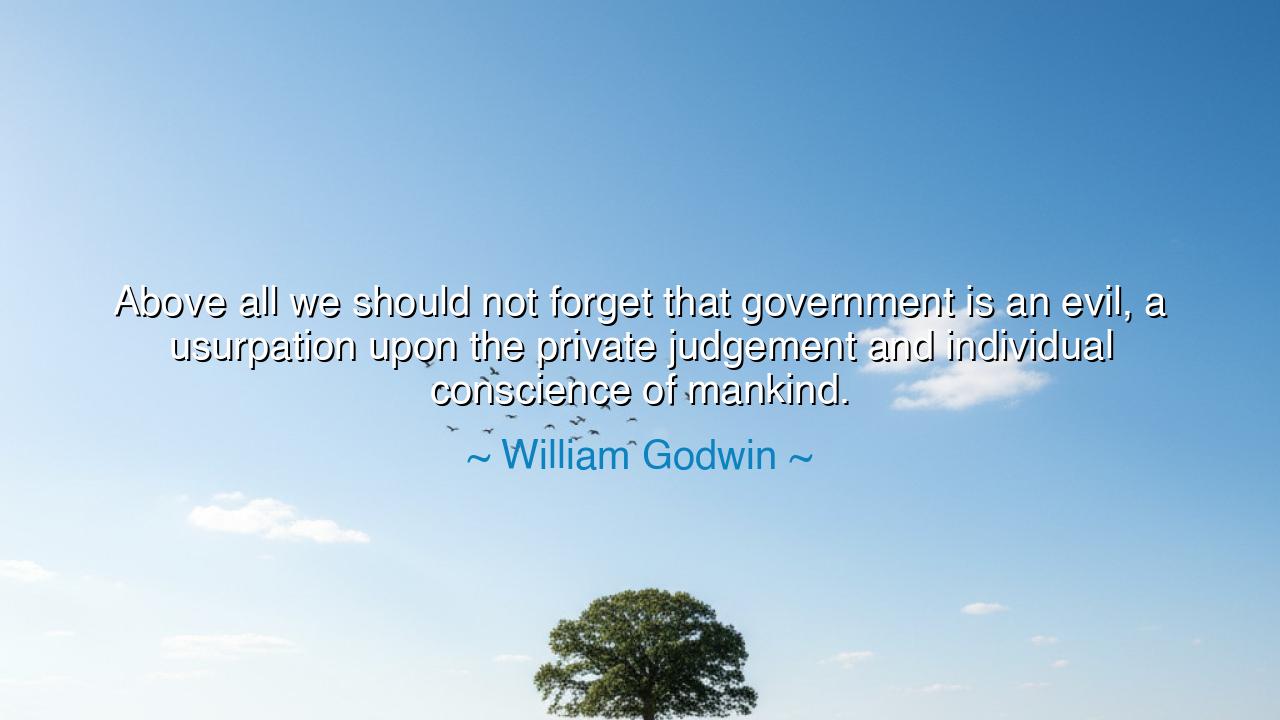
Above all we should not forget that government is an evil, a
Above all we should not forget that government is an evil, a usurpation upon the private judgement and individual conscience of mankind.






The words of William Godwin fall like thunder upon the mountains of power: “Above all we should not forget that government is an evil, a usurpation upon the private judgement and individual conscience of mankind.” These are not the careless words of rebellion, but the deliberate voice of a philosopher who gazed deeply into the heart of authority and found its shadow. Godwin, writing at the dawn of the modern age, when monarchs still ruled by divine right and revolutions burned across Europe, sought to awaken the spirit of man to his own moral sovereignty. His cry was not for anarchy born of chaos, but for liberty born of conscience—the belief that every human soul possesses within it the light of reason, and that any government which dims that light, however noble its guise, commits an act of spiritual theft.
The origin of this quote lies in Godwin’s great work, An Enquiry Concerning Political Justice, published in 1793—a time when the fires of the French Revolution blazed with both promise and peril. The kings of Europe trembled, the philosophers debated, and the people, long crushed under crowns and taxes, began to imagine a world where reason and virtue might replace coercion and fear. Godwin, inspired by the Enlightenment, took this dream further than most. He argued that the true progress of humanity lay not in stronger governments or wiser rulers, but in the gradual perfection of the human mind. To govern another, he said, is to distrust his reason; to compel him by law is to confess disbelief in his virtue. Thus, in his eyes, government was not merely a necessity—it was a moral failing, a crutch for an undeveloped humanity.
In the ancient style, let us consider the heart of this wisdom. When Godwin calls government an evil, he does not mean it in the narrow sense of tyranny or cruelty, but in the deeper sense of interference with conscience. For what is government, he asks, but one man’s judgment imposed upon another? When a state decrees what is right, it declares that the individual cannot decide for himself; when it punishes, it declares that virtue must be enforced, not chosen. In this way, all authority, however gentle, carries within it the seed of oppression. The ancients knew this truth well. The philosopher Laozi taught that the more laws a nation has, the more it is filled with thieves. Epictetus and the Stoics declared that the only true kingdom is mastery over oneself. To Godwin, these were not metaphors—they were the very essence of human dignity.
Yet he was not naïve. Godwin understood that men were imperfect, that societies required order to prevent harm. But he believed that the cure for disorder was not more law, but more enlightenment. As knowledge spreads, he said, compulsion becomes unnecessary, for the wise do not need chains to act justly. His vision was not of a lawless world, but of a self-governing humanity, where conscience replaces command, persuasion replaces punishment, and cooperation replaces coercion. In his ideal future, the state would wither away—not through revolt, but through evolution, as reason and empathy made rulers obsolete. Such was his dream: a world where mankind lived not under the yoke of fear, but under the guidance of understanding.
History offers us glimpses of this truth in motion. Consider Mahatma Gandhi, centuries after Godwin’s time, who led his people not with laws or armies, but through the force of conscience. When the British Empire imposed its rule, Gandhi resisted not with violence, but with the inner strength of moral conviction. He trusted that the conscience of free men, awakened and united, could defeat the might of empire. And he was right. Like Godwin, Gandhi believed that authority corrupts both the ruler and the ruled—that the highest form of freedom is self-rule, not imposed by government, but by the discipline of the soul.
And yet, Godwin’s words must not be misunderstood as a call to chaos. He does not say that all governance should vanish in an instant, but that all government must be judged by its restraint. When the state grows vast and intrusive, when it meddles in thought, belief, or the simple liberties of life, it ceases to serve its purpose and becomes the very evil it was meant to restrain. The wise ruler governs least, and the wiser people govern themselves. A nation that depends too much on authority becomes weak in virtue; a nation that cultivates virtue makes authority unnecessary.
So, my children of the future, remember this sacred teaching: the conscience of man is the true foundation of justice. Law without morality is tyranny, and obedience without understanding is slavery. Seek not freedom from all order, but order born from within. Build societies where men act rightly because they love truth, not because they fear punishment. Educate, enlighten, and awaken—these are the weapons of the free.
For as William Godwin taught, government is a shadow cast by ignorance; when the light of knowledge grows bright, the shadow fades. The true revolution is not in the streets, but in the soul. Let each man become his own governor, and the world shall need no masters. This, then, is the eternal command of reason: trust in the conscience of mankind, for in that sacred inner law lies the only authority that does not corrupt, and the only power that truly sets men free.






AAdministratorAdministrator
Welcome, honored guests. Please leave a comment, we will respond soon